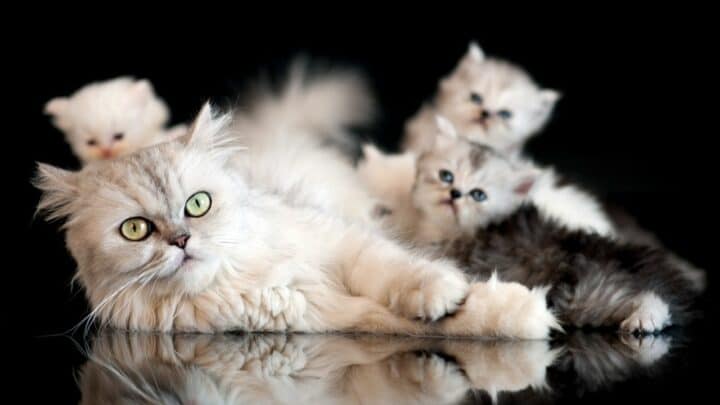If you are a cat owner, you may have heard that it is healthier for your cat to have a litter before being spayed or neutered.
You may wonder whether this information is accurate, and if so, why?
While it is true that spaying and neutering tend to increase the amount of fat that accumulates in a cat’s rib cage, this fact has little to do with whether the cat has already produced a litter.
So, what is the truth about spaying or neutering prior to having a litter? And what is the healthiest route for your cat?
How Is It Healthier for a Cat to Breed Before Being Spayed or Neutered?
It’s actually a myth that cats should breed before being spayed or neutered unless you want to have a litter of kittens. Spaying and neutering can contribute to a cat gaining weight, but this can happen regardless of whether the cat has bred before the procedure.
Kittens Can Be Spayed or Neutered as Young as Eight Weeks
While you may have already heard that it’s possible to spay or neuter a kitten, you may be holding off and waiting for the first litter, but unless you actually want a litter of kittens, it is perfectly safe to have your cat spayed or neutered at a young age.
Ideally, you should have a female spayed before the first heat cycle to best prevent the development of breast and uterine cancers, and it is recommended to have the procedure done before your cat reaches five months old.
Spaying and neutering are much more cost-efficient than caring for a kitten litter.
Unfortunately, many kittens are euthanized due to lack of enough homes, so you may have trouble finding good homes for a litter after they are weaned off their mother.
Spaying and Neutering May Cause Weight Gain
Now, this claim is still up for debate. While many experts have acknowledged that spaying and neutering can indeed contribute to weight gain, it’s agreed that this unfortunate side effect can be remedied by feeding your cat a healthy, balanced diet.
Over-feeding and lack of exercise play larger roles in cat obesity than spaying and neutering do.
Cat obesity can be diagnosed by feeling alongside your cat’s rib cage. If a feline’s waistline isn’t visibly noticeable or you can’t feel your feline’s ribs, then chances are that your cat is overweight.
Indoor cats are more likely to become obese due to inactivity and the availability of food, but diets that are high in protein and low in carbs can help your cat to shed the extra pounds.
While cat obesity has been linked to spaying and neutering, waiting until your cat has already bred before having them fixed won’t prevent weight gain. Diet and exercise will.
Spaying and Neutering Have Many Health Benefits
Did you know that a whopping 90% of breast tumors in cats turn out to be cancerous? Unfortunately, that is NOT a myth.
And spaying your female cat can prevent these tumors from ever developing and lengthen your cat’s life span. Spaying your female cat will also stop them from spraying when they are in heat, so if you don’t want cat urine to be distributed throughout your home, spaying is a good idea.
If you have a male cat, neutering offers just as many health benefits as spaying does. Neutering can prevent testicular and prostate cancers in male cats and prevent territorial and roaming behaviors.
Unneutered male cats are more likely to develop certain cancers, and they tend to wander off in pursuit of a female cat’s scent.
However, spaying and neutering don’t immediately produce docile, loving pets.
Neutered males will still have a small amount of testosterone left after the procedure, and spaying and neutering will not impact your cat’s individual personality characteristics or eliminate previously learned behaviors.
Frequently Asked Questions about How is it Healthier for a Cat to Breed Before Spaying or Neutering
Are spaying and neutering good for cats?
Neutering and spaying have many health benefits. Cats who aren’t spayed and neutered are 7 times more likely to develop terminal cancers as they age, than cats who are fixed. Spaying and neutering prevent breast, uterine, and testicular cancers in cats, which results in a longer life span.
Do female cats change after spaying?
Spaying has absolutely no effect on a female cat’s personality. Spaying only impacts their mating behaviors, so they will no longer go into heat or spray their surroundings during their heat cycles.
Why is my feline hyperactive after neutering?
Initially, a male cat may behave erratically or even become aggressive immediately after having been neutered. It was an exciting and unpleasant day! Fortunately, this is just an adjustment period. Cats usually become more docile and affectionate after being spayed or neutered.
Conclusion
So, there really isn’t much of an answer to this question. It is a myth that breeding your cats before spaying or neutering has health benefits, and this has very little to do with a cat’s rib cage.
It’s best to spay or neuter your cat before their first heat cycle unless you are just psyched about the idea of a litter of kittens.


